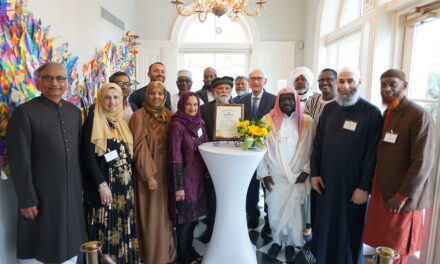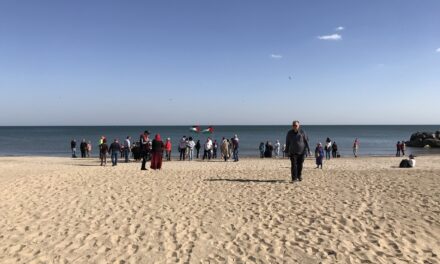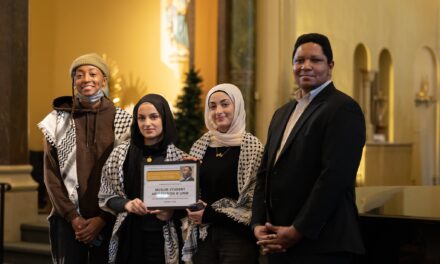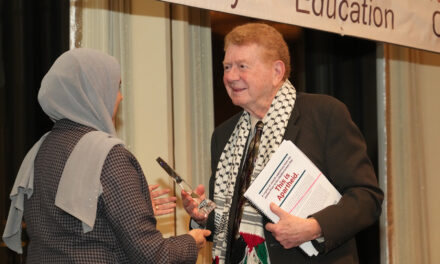
Photo courtesy of Pixels
Learning anger management techniques improves relationships, says Mehwish Aqueel, a counselor with Milwaukee Community and Health Center. Aqueel is the featured speaker Saturday at a free workshop at the Islamic Resource Center.
“I get angry. That’s just how I am.”
That’s a rampant misconception, said Mehwish Aqueel, MSc, a licensed professional counselor at Milwaukee Community and Health Center, in an interview Thursday with the Wisconsin Muslim Journal. “Our response to anger is not an inherited trait. It is learned behavior.”
Perhaps we observed our parents, other family members or people in our community react to anger aggressively and loudly. They may see yelling and threatening as a way to control the situation.
But at what costs?
After someone expresses what they feel by yelling, breaking things or even hurting someone, they may feel better, having let the emotion out, she said. They may be able to return to their normal self.
“In the short term, they may feel better, but what is really happening as a consequence of their behavior? Other people lose trust in their relationship. Family members become afraid of them. Research has shown that expressing anger inappropriately even affects them physically, raising their blood pressure and creating heart issues.
“When anger is expressed in an appropriate way, it is positive. It motivates us to problem solve, to do something about a situation. It helps us take another step towards something we want to achieve.”
Aqueel, a licensed and nationally certified counselor at MCHC’s Outpatient Behavioral Health Counseling Services, is leading a free workshop, Conflict Resolution and Anger Management: Techniques to use for Muslim Families, on Saturday, Aug. 5, from 11 a.m. to 1:30 p.m., at the Islamic Resource Center, 5235 S 27th St Milwaukee, WI 53221, and via Zoom. Register here.
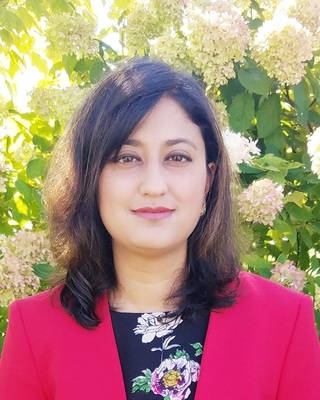
Mehwish Aqueel, MSc, will lead a free workshop on anger management Saturday at the Islamic Resource Center in Greenfield.
This program is part of the Milwaukee Muslim Women’s Coalition’s yearlong educational training on behavioral health. It is offered with support from the Wisconsin Department of Health Services and Froedtert & the Medical College of Wisconsin.
“I would love for anyone in the community to come and benefit from the program,” Aqueel said. “One of the goals of MCHC is to de-stigmatize mental health services.” These services offer techniques you can learn to improve your life and relationships. “It doesn’t mean there is something seriously wrong with you.
“If just one person from a family attends, it can make a big difference. Change begins with one person.”
How to manage anger
As a preview of Saturday’s workshop, WMJ interviewed Aqueel about anger management and her background in counseling. Here are the highlights:
Is it normal to be angry?
To be angry to some extent is normal. But intense anger, and an aggressive reaction to it, can turn into a habit. In the workshop, we will talk about strategies to break the anger habit. We’ll discuss how to raise awareness in ourselves to see red flags, the emotional and even physical cues. By bringing cognitive awareness, we can prepare to react by thinking about the long-term consequences of our reactions.
Anger management sounds like something we do ourselves, while conflict management involves two or more parties. What is the relationship between these topics?
If a family member has trouble controlling their behavior, the whole family is affected. To manage your anger effectively, there are three steps, the three As: awareness, acknowledgment of the problem and action.
Does culture and communication style play a role?
Absolutely. In several cultures, if you want to make a point, if you want to be heard, you may feel the need to speak louder than you normally would. But we know from research that the tone of your voice is very impactful, both to others and to ourselves. When we raise our voices, our heart beats faster. We show other physiological responses to stress. We may hyperventilate.
We also know we can choose how we react. For example, despite our family norm, we will tone ourselves down in the workplace and not be loud in meetings. The same thing happens with students in class when speaking with their professors.
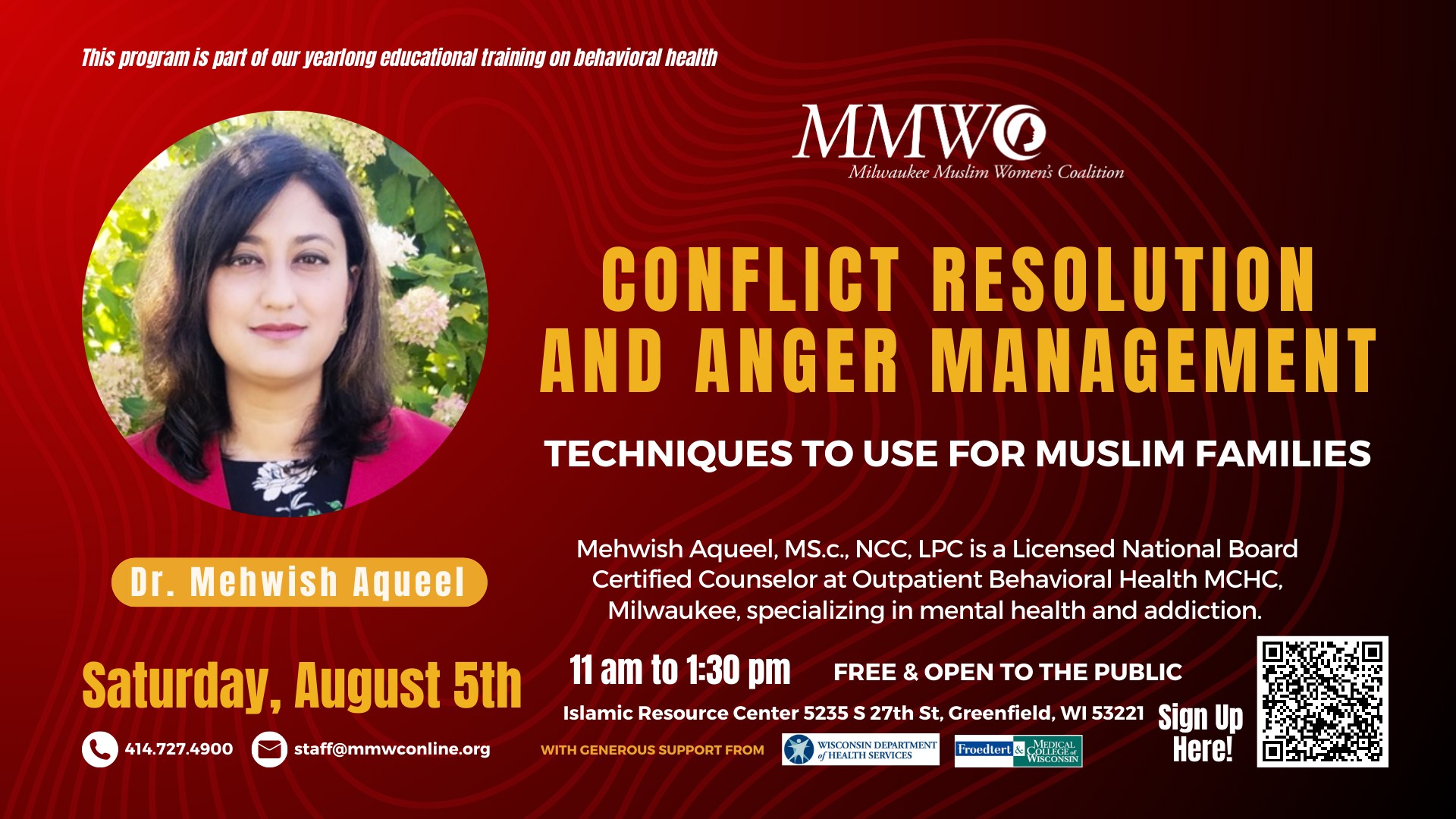
Are your anger management techniques based on a particular approach?
My approach draws on various evidence-based treatments, mainly from cognitive behavioral therapy (a therapy that helps identify and change thought patterns) and dialectical behavior therapy (a type of CBT that focuses on mindfulness). Both of these models are very impactful.
How did you decide to go into this field?
I had a medical degree from my country (Pakistan). Then, in my journey as a mother of a child who had a serious health issue, who was bedridden for three years, and as a professional who was here as an immigrant, I faced a lot of hurdles. With my family in different countries, I didn’t have a lot of support or resources as a mom and a young professional who wanted to grow. My husband was a partner through this but there weren’t resources or other people who had the multicultural competency to understand me. Seeing that need was a big motivation for me to go into this field.
It was a journey where we met amazing providers in his healing process. We learned to adapt, to accept the process. We learned from our own emotional trauma and grief. I learned to be resilient. It was a pattern of resiliency I achieved over time. Through those experiences, you learn to shape your beliefs. I learned that instead of asking “Why me?” to reframe that negative thinking. Developing optimism is a journey.
You mentioned offering trauma-informed care in your practice. What does that mean?
Trauma-informed care is about helping people understand where the strong emotions they experience are coming from and how negative experiences they have had shaped their belief systems, and how they can change the way they react.
Sometimes we are only able to see the tip of the iceberg. We go on an exploration in our sessions to see the deeper part, what lies below, what’s hidden. It is a process that takes a lot of time and effort. We work on developing coping strategies because it is not easy to start talking about their vulnerabilities and their history.
